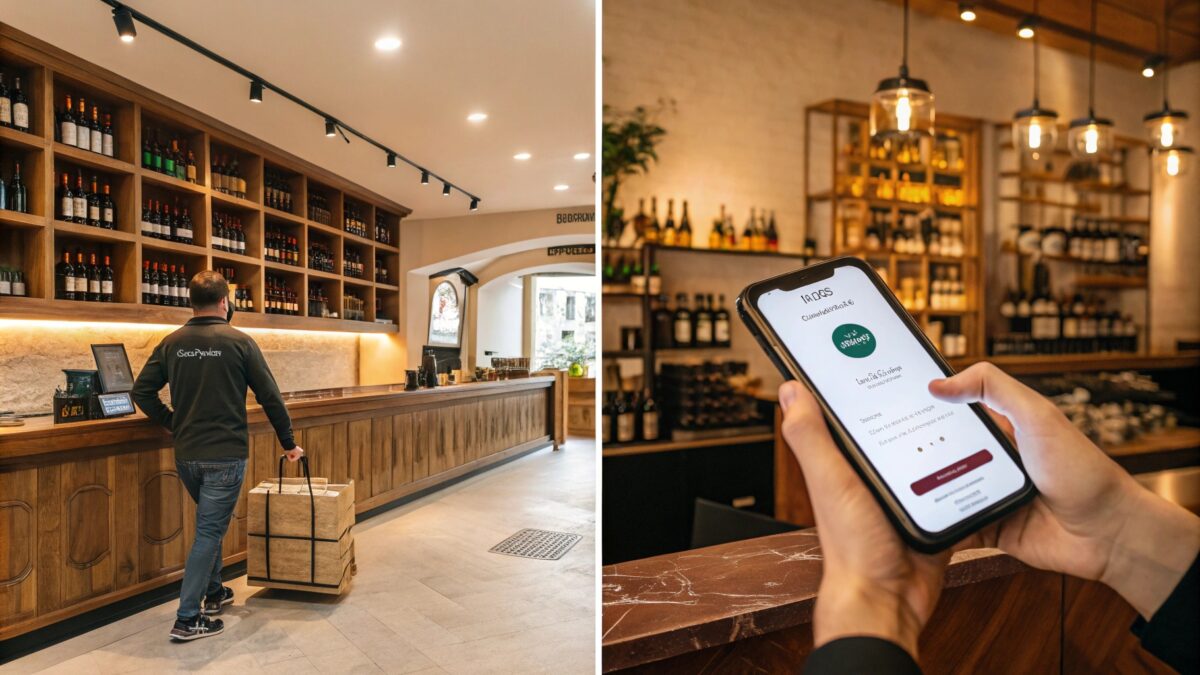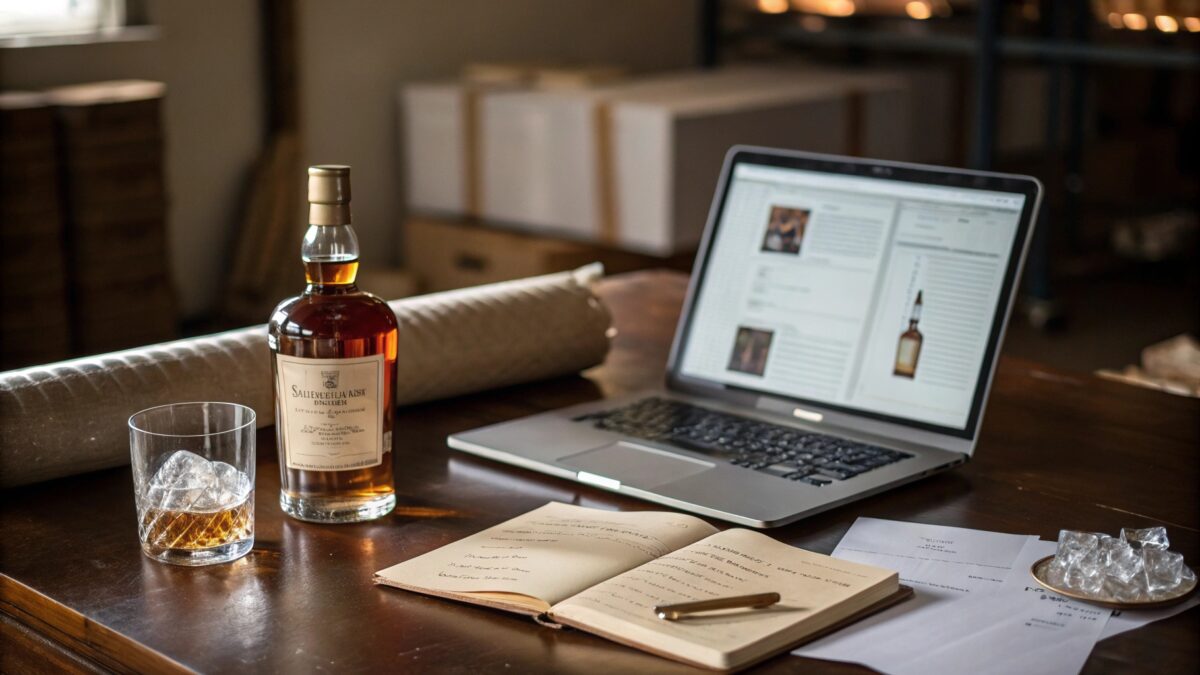Small-batch spirits are booming, with sales expected to hit $72.85 billion by 2031. Online stores have become key sales channels for small distilleries, as 85% of buyers like to buy straight from makers. North America leads the way with 59% of worldwide sales, and the market is growing fast at 28.4% each year through 2030. Most customers want their drinks brought to their homes, with 87% picking delivery and 82% ready to try new brands they find online. While state rules and shipping laws can make things tricky, new solutions and strong market trends show big chances for growth in this fast-changing industry.
Key Takeaways
- The craft spirits market is experiencing rapid growth, projected to expand by 28.4% annually through 2030, reaching $72.85 billion.
- Online alcohol stores enable small distilleries to reach consumers directly, with 85% of craft spirit drinkers preferring direct purchases.
- Digital platforms offer innovative features like curated tastings and gift packages, enhancing the craft spirit shopping experience.
- Consumer demand drives market growth, with 87% preferring home delivery and 82% willing to explore new craft spirit brands.
- Smart compliance tools and advanced tracking systems help online retailers navigate complex state regulations while ensuring proper delivery.
The Craft Spirit Revolution
The rise of craft spirits is changing how we buy and enjoy alcohol, with online stores becoming key places for small distilleries to sell their drinks to interested buyers.
The market now offers more choices than ever, and stores like Great American Craft Spirits and Uptown Spirits sell many different small-batch and special drinks.
Teaching buyers about craft spirits has become very important, with websites like Caskers helping people choose drinks and learn about them.
Online stores are trying new things to stand out, such as surprise barrel tastings, gift packages for businesses, and special deals with nearby distilleries.
Buyers also benefit from easy delivery, clear return rules, and hand-picked collections that make it simpler to find good, special spirits.
Market Growth and Industry Impact
The craft spirits market is growing fast, changing how people buy and drink alcohol. Numbers show it will grow by 28.4% each year from 2024 to 2030. Starting at $21.40 billion in 2023, the market offers many chances to invest, especially in North America, which makes up 59% of worldwide sales.
While there are some hurdles, helpful laws and younger buyers are pushing the market to new heights. Companies are finding new ways to make and sell their drinks, working together, and focusing on being eco-friendly.
Many regular craft spirit drinkers – about 85% – want to buy directly from makers where laws allow it. Bars and restaurants bring in most of the money at 57.4%, while stores and online shops are selling more and more, showing how buying habits are changing as digital sales become more common in the spirits business.
State Distribution and Regional Leadership
Getting craft spirits to customers across different states in the US and Canada is tricky because each place has its own rules. Online sellers must follow these rules and get the right permits, or they could face big fines.
Local pride and character have become key selling points in the craft spirits world, especially in places like Kentucky and Indiana. These areas use their unique features and local ingredients to stand out in the market.
Online sellers like Seelbach’s carefully check local makers to make sure their products are genuine and well-made. This helps meet customer demand for real, high-quality spirits while working within each state’s rules about shipping and selling alcohol.
Direct-to-Consumer Shipping Landscape
Online selling has changed how craft spirits get from makers straight to buyers, opening new doors but also bringing new problems for sellers. As the market grows, businesses must deal with different rules and laws that vary from state to state.
| Aspect | Challenge | Solution |
| Rules | Different state laws | Smart law-checking tools |
| Age Checks | Keeping minors from buying | Online ID checking |
| Delivery | Package tracking | Live tracking tools |
| Money | High shipping costs | Smarter delivery routes |
| Help Desk | Handling returns | All-in-one customer tools |
Better online stores and tracking tools help sellers get past old delivery problems. Safe payment methods and ways to check buyers’ ages make shipping safer, while number-crunching helps keep the right amount of bottles in stock and makes buyers happier. These tools help small spirit makers reach more customers while following all the rules.
Online Sales Trends
The craft spirits market is growing fast, with sales expected to rise from $29.09 billion in 2023 to $100.01 billion by 2028, growing by 27.6% each year.
Online marketing and selling have helped drive this growth, letting small distilleries reach customers worldwide.
Market growth numbers show strong upward trends:
- The Asia-Pacific area is growing fastest at 35.1% yearly through 2030
- North America has the biggest share of sales
- India’s market is growing very quickly at 35.6% yearly
Online shopping has changed how people find and buy craft spirits, with internet marketplaces helping small distilleries reach more customers than ever before.
This shift to online sales has stayed strong even when the economy is tough, helping the market keep growing through better ways of selling products.
Regulatory Hurdles and Market Access
Getting into new markets has been hard for small spirit makers because of strict laws, but things are changing for the better.
New York’s new law (S.2852A/A.3132A) now lets small makers ship their drinks straight to buyers, helping them reach more customers than before.
The law sets clear rules, like checking buyers’ age and using proper packaging, and makes it easier to sell across state lines.
These rules follow what has worked well with wine shipping.
Small and mid-sized makers of spirits and ciders can now ship directly to customers permanently, not just during COVID-19 as they did before.
With the State Liquor Authority working with shipping companies like UPS, these makers can now sell their products online more easily and grow their businesses.
Consumer Behavior and Preferences
More people who love craft spirits want them delivered to their homes. This number grew from 80% in 2022 to 87% in 2023, and stayed high at 85% in 2024.
Most spirit drinkers (81%) want laws changed so they can get these drinks shipped to them.
Looking at buying patterns shows big opportunities:
- 81% would buy spirits at least once a month through shipping
- 47% would spend more than $100 monthly on shipped craft spirits
- 77% have found special spirits while traveling that they can’t buy where they live
These numbers show how shopping habits are changing.
Most craft spirit drinkers (82%) say they would try new brands if home delivery was possible, showing there’s room for growth in this market.
Future Market Opportunities
The craft spirits market worldwide is set to grow big, reaching $72.85 billion by 2031, going up by 20.84% each year. What’s driving this growth? Clean, earth-friendly making methods and new taste ideas, especially in new markets where people are trying different drinks.
| Market Opportunity | Growth Potential |
| North America | 62% market share |
| India | 35.6% CAGR by 2030 |
| US Market | 29.4% CAGR by 2030 |
| Online Distribution | Rapid expansion |
| Sustainability Focus | High consumer demand |
Online selling is picking up speed, with young adults leading the push for special, locally-made drinks. Makers who use clean methods and create new flavors with local ingredients are likely to do well, mainly in places where people have more money to spend and want better quality spirits.
Frequently Asked Questions
What Types of Insurance Do Craft Distilleries Need for Online Sales?
Craft distilleries need strong insurance protection when selling online. This includes basic coverage for accidents and injuries, protection against cyber attacks, insurance for pulling products off the market, and special plans that cover shipping deals and follow state laws.
How Long Does Craft Spirits Shipping Typically Take Across Different States?
Shipping craft spirits usually takes about 2-4 days for the seller to get your order ready, plus another 3-5 days for delivery within the country. If you live far from cities or in harder-to-reach areas, it might take longer. Each state has its own rules about alcohol shipping, which can add extra waiting time for paperwork checks.
What Temperature Conditions Are Ideal for Storing Craft Spirits at Home?
Store craft spirits at 55-60°F in a cool, dark place away from sunlight to keep them fresh. Keeping them at the right temperature and watching the moisture in the air helps them stay tasty longer and stops them from going bad.
Are There Age Verification Systems Specifically Designed for Craft Spirits Websites?
Age checking tools made for craft spirits websites use simple ID checks, outside verification companies, and automatic systems to make sure they follow online sales rules and stop underage buyers.
How Do Seasonal Weather Changes Affect Craft Spirits Shipping and Delivery?
Weather changes during different seasons make shipping craft spirits harder. Cold or hot weather can harm the products, slow down deliveries, and force companies to use extra packaging. Winter is especially tough, making it harder to get bottles to their destination safely and on time.
Conclusion
Small-batch spirits are becoming more popular in online liquor stores as buyers’ tastes change and laws adapt. Sales numbers show strong room for growth, especially in states that let distilleries ship straight to customers. As websites get better and shipping gets easier, small distilleries can sell to more people. The mix of online shopping and handcrafted spirits points to steady growth in online sales over the next few years and after.
Ready to explore unique craft spirits? Browse our selection at Nation Wide Liquor and discover your next favorite bottle with easy nationwide shipping right to your door.









